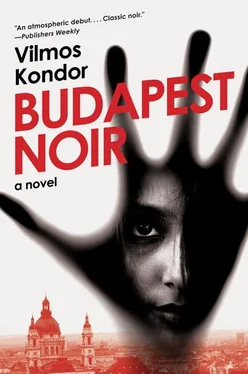“Then what?”
“Skublics is a Communist.”
Nodding slowly, Gordon processed this information, which, as Csuli knew full well, was worth its weight in gold. Even the police must have known how Skublics made his living. That sort of stool pigeon was useful to the detectives. But if it turned out that he was a Communist, why then, nothing could save Skublics from the state security police, headed by József Schweinitzer. And no one had escaped an encounter with them without a scratch. If they escaped at all. Most wound up in a detention camp for undesirables; Gömbös, along with Miklós Kozma, the interior minister, had made sure of that. The fewer of these types that were out in the streets, the better for everyone else. Hungary’s Communists organized themselves in tiny cells and met in the greatest secrecy—never in the same place—and it was impossible to imagine what they could be up to. Not that Gordon believed the rumors that Szilveszter Matuska, who derailed the Vienna Express on a bridge near Budapest back in 1931, killing twenty-two, was a Communist and not just insane. But he knew Skublics was now in the palm of his hand.
“I see,” he said, looking at Csuli. “Where does he go for meetings?”
“What do I get in exchange?” The fat man’s eyes lit up from behind his glasses.
“I won’t write a word about you.”
“And you’ll let me know if someone else is going to write about me for any reason.”
“I can’t promise, but I can try.”
“Good. Then I can try figuring out where Skublics goes for meetings.”
“You have until eight tonight. Tomorrow I’m meeting with Vladimir Gellért.”
“I’ll do all I can.”
“That I believe.”
Gordon headed down a deserted Rákóczi Street toward the Parliament building. He boarded a tram and transferred to another at Apponyi Square. On Károly Boulevard there were more people milling about, walking with their heads down among the sparse but well-ordered line of soldiers and police. Gordon got off at Constitution Street and headed toward Kossuth Square. All the gas and electric lights along the road were on, but every one was shrouded by a black veil. The crowd seemed to murmur in unison, as if simultaneously praying. It was a couple of minutes after nine-thirty. Gordon had arrived earlier than planned, but despite his aversion to funerals, he didn’t mind: it was a rare occasion when everyone was gathered together—both those who counted and those who did not. The uniformed honor guard that was to accompany the coffin extended in a line all the way to the main steps of the Parliament building. On the flagpoles jutting out from buildings along the route hung not only the Hungarian red, white, and green tricolor but also the flag of Gömbös’s National Unity Party. Gordon shook his head and continued toward the Parliament building. Waiting on the square were the army, infantry, artillery, and cavalry units that would march after the indoor ceremony. All at once Gordon caught the drone of airplanes. Turning his head skyward, he saw nine planes fly in formation over Kossuth Square. Despite having read the official funeral schedule earlier, this display still surprised him. The storm troopers that belonged to the police units led by Dr. Gyula Kálnay clicked their heels and saluted.
The same detectives who’d stood at the main entrance before were there once again. Gordon nodded, and they waved him on. Several hundred wreaths lined the portico, and the guests trod slowly upward over the red-carpeted stairs.
No sooner had Gordon ascended to the rotunda than one of his colleagues noticed him and called him over. On his way, Gordon caught a glimpse of Turcsányi standing behind a column. Having seen Gordon as well, the section editor said a few parting words to his company and approached Gordon. “Just in time” was his grumbled greeting. “Before the procession begins, I want you to interview the British and American ambassadors.” Pointing toward a group of elegantly dressed men in derby hats who were seated to the right of the bier, he added, “Hurry, they’re not going to wait for you.” Gordon nodded and went around the open coffin. He cast a sideways glance at the dead prime minister. Gömbös was lying inside decked out in the finest Hungarian ceremonial attire, surrounded by a sea of flowers, bouquets, and wreaths. Gordon recoiled. This corpulent character, this mockery of a soldier, this oldster with failing kidneys had led the country? This was a man who’d had a free pass from several European governments? This was the man who’d led the National Unity Party with an iron fist and the man whose word had made even Kálmán Kánya jump? Gordon shrugged and stepped toward the group of seated gentlemen.
A smartly dressed man now stepped in front of Gordon with a determination that belied his servile expression. Gordon recognized him as a deputy department head in the foreign ministry, as he asked the reporter what he wanted. “To interview the British and American ambassadors,” Gordon replied. The man shook his head: not here, not now. Gordon finally left with the promise that he would be able to speak with the ambassadors during the procession. He was on his way out when the crowd suddenly fell silent. It was as if a schoolteacher had struck a classroom desk with a reed switch. Gordon slunk behind two hussars and looked on from there. For a couple of minutes nothing happened. Then came the clang of unsheathed swords, the clicking of heels, and the click-clack of stiff, soldierly steps. Gordon peered out from over the hussars’ shoulders.
First the Bulgarian ambassador, Stoil Stoilov, stepped up to the bier and silently lowered his head. He was followed by Galeazzo Ciano, the Italian foreign minister, and Kurt Schnuschnigg, the Austrian chancellor. Finally, a fat man with an oily complexion started toward the bier. He wore black boots polished to a sparkle, a leather jacket pulled tight around his belly by a belt, and a flat service cap that covered his eyes. Gordon shuddered. This was Hermann Göring, supreme commander of the Luftwaffe, Prussian interior minister, the man in charge of the four-year plan of the empire’s military economy, and Hitler’s most loyal backer and devotee. Göring stopped in front of the coffin, the Iron Cross hanging from his neck. He clicked his heels, threw back his head, and then, swinging his arms forward to clasp his hands, he stood in silence for a few moments. The quiet was broken only by the snapping of cameras and the popping of their flashes. Göring now turned around and took his seat to the right of the bier. He had barely reached his seat when Archbishop Jusztinián Serédi appeared, stood mutely for some moments, and then sat down to the left of the bier. Gordon glanced over at the Prussian interior minister, whose face remained unreadable, and suddenly Gordon recalled what Gömbös had boasted to Göring in the spring: by applying the fascist principles learned from the Germans, Gömbös would reshape Hungary within two years and would preside over the new state as its dictator.
Kálmán Darányi stood up and went to the steps leading to the rotunda. Gordon winced the moment he heard the sound of clicking heels. He glanced at the red velvet chair set apart on its own beside the bier. Hungary’s regent, Miklós Horthy, now appeared on the steps in his admiral’s uniform, his head topped off by a calpac, and his chest bearing the Grand Cross of the royal Order of Saint Stephen of Hungary. It was practically with piety that Darányi—in the company of the two speakers of Parliament, Sándor Sztranyavszky and Bertalan Széchenyi—greeted the head of state, who took determined steps toward the velvet chair, adjusted his sword, and sat down. Gordon shook his head with silent glee at the sight of the admiral’s uniform. The regent, his face somber, knit his brows and stared into the air. Silence had once again descended upon the hall when the clergy arrived, with Lutheran bishop Sándor Raffay in the lead. Gordon looked at his watch. A few minutes past ten. He sighed deeply, took a seat in the rows reserved for the media, and proceeded to listen to one speech after another as the funeral began. After Raffay came Darányi, who in turn was followed by Sztranyavszky, and then Széchenyi and, finally, Béla Ivády, president of the National Unity Party. Gordon’s head was buzzing by the end. It seemed as if this was the funeral for someone like the American president, Franklin Delano Roosevelt, instead. A champion of freedom, said the orators. A man who struggled for the rise of the nation; someone whose efforts brought the country order, security, and economic prosperity. A creative genius hammering out his people’s future. Sometimes Gordon glanced up at the given speaker in surprise. Was it only now that he would learn how great a loss this was? A champion of democracy—luckily that was left off the list. Only then would the laudation have been complete.
Читать дальше
Конец ознакомительного отрывка
Купить книгу












